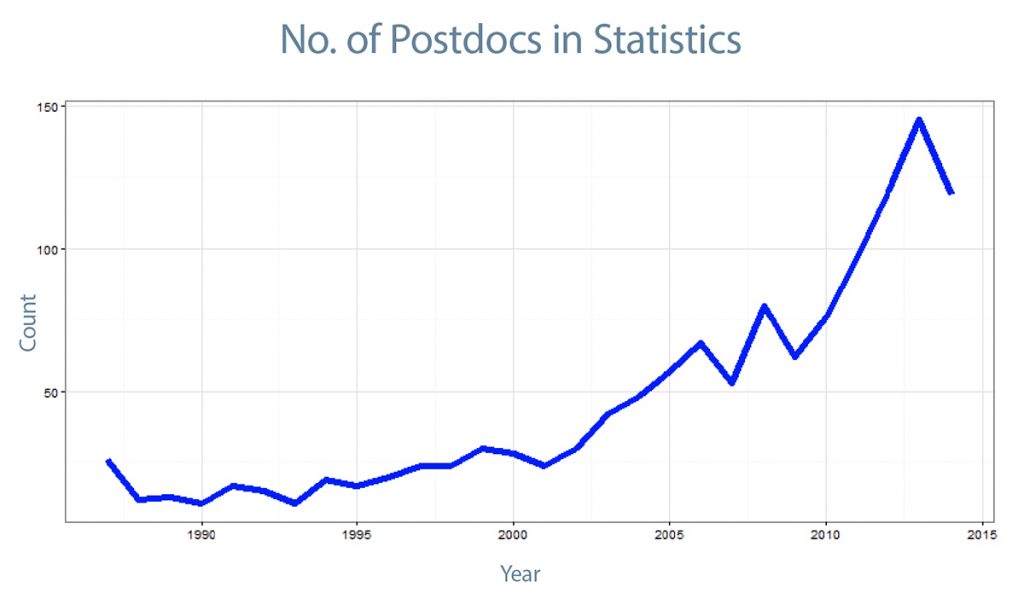 Karl Pazdernik is a postdoctoral scholar in the department of statistics at North Carolina State University. He earned his PhD in statistics from Iowa State University, worked at Intel as a statistical consultant, and spent time at the National Center for Atmospheric Research working on spatial statistics methods.
Karl Pazdernik is a postdoctoral scholar in the department of statistics at North Carolina State University. He earned his PhD in statistics from Iowa State University, worked at Intel as a statistical consultant, and spent time at the National Center for Atmospheric Research working on spatial statistics methods.
Twenty years ago, the number of postdoctoral scholars with an emphasis in statistics in the United States numbered in the teens. Of course, the number of doctoral degrees being granted has been growing in all disciplines, and statistics has been no exception. In the October issue of Amstat News, Steve Pierson described and illustrated this trend.
For those looking to transition into a tenure-track academic position at a Research I university, the increase in suitable candidates has increased the level of competition for jobs. A successful postdoctoral experience can appeal to the hiring committee within a department, which has led more recent graduates to accept positions as postdoctoral scholars.
Compared to the more linear growth in the number of PhDs being granted, the pattern of growth in the number of postdoctoral scholars has been closer to exponential, as Figure 1 illustrates.

Figure 1. The number of postdoctoral scholars in statistics versus time. The data source is the WebCASPAR database.
That is not to say all is gloom and doom. Even as a postdoc, those of us fortunate enough to have heard the calling to be statisticians should be grateful. Where your entomology counterpart may be barely hovering above poverty, postdocs in statistics are typically more comfortable financially. In fact, given the history of low wages for many postdocs, a new overtime pay rule has required that postdoctoral researchers get paid at least $47,476 or require reporting timecards.
Excessive overtime stuck in a laboratory collecting data while eating top ramen. Although this may be the visual often applied to postdocs, it is unlikely to be a fair depiction of a postdoctoral scholar in statistics. So, what are the challenges and disadvantages? Why apply for a postdoctoral position in the first place?
Challenges
The first challenge you will face as a postdoctoral scholar—and this applies to all postdocs regardless of the field—is that no one will know where to put you. By that I do not mean you will struggle to find an office, although you may be requested to move to free up space or to share an office with another postdoc. I mean you are no longer a student—not quite faculty, but not staff, either. Your university ID will likely say “faculty/staff” on it, but when it comes to benefits, health care, vacation, responsibility, etc., you are unlikely to fit either category.
Postdocs have their own category, which often is not well defined. The resources for both students and faculty at a university are plentiful, but it may require some navigation to take full advantage of those granted to postdocs. Don’t wait to learn the ropes!
The second drawback to being a postdoc is the added stress. Is it the same stress experienced by a tenure-track faculty during their first few years at the university? Probably not. However, unless your grant has endless funding, there is likely a time limit to how long you can stay, so the clock is still ticking.
Then there is the obvious disadvantage to being a postdoc: It is a temporary, low-paying job. Yes, you may have it better than most postdocs, but compared to your statistics colleagues in industry, you will be making peanuts.
Benefits
So why bother? A postdoctoral position in statistics can serve the same purpose as in any discipline; it can help bolster your curriculum vitae. This is a great time to finish any unpublished work from your dissertation and create new lines of research.
If you are interested in pursuing a career in academia and did not have the opportunity to teach a course in graduate school, you will almost certainly be given the option. As an academic at a research institution, grant writing will undoubtedly become a primary focus and your principal investigator (PI) may ask that you assist in the process. Your PI will typically have graduate students they mentor, and you may also be called upon to assist in that endeavor. All of this is great experience and will prepare you for the next step in your career. Being a postdoc allows you to peek behind the faculty curtain and get a glimpse of what that career may be like.
So, what if becoming faculty is not your raison d’être? A postdoctoral position can still provide value if you are interested in a research-active role, such as working at a national laboratory. In fact, many national laboratories will hire postdocs in statistics and give them the opportunity to grow into a permanent role.
Regardless of an academic, industry, or government career path, where a postdoctoral position can be most beneficial is in growing as an independent professional. Understanding how to network, refining your professional image, and improving your efficiency are all critical to success and skills that can be improved during a postdoc.
Advice
My suggestion to those planning to pursue a position as a postdoctoral scholar is to be as involved as you can without negatively affecting your primary purpose: publication. That means attend your department seminar as often as you can. Interact with the faculty and make yourself visible; an interesting collaboration is often right outside your (office) door. Take the opportunity to mentor undergraduate/graduate students. Even if you don’t pursue academia, the experience of being in the mentor role can be both valuable and rewarding. Above all else, when your time is up, feel proud in what you have achieved and confident in the career you’ve chosen.



Leave a Reply